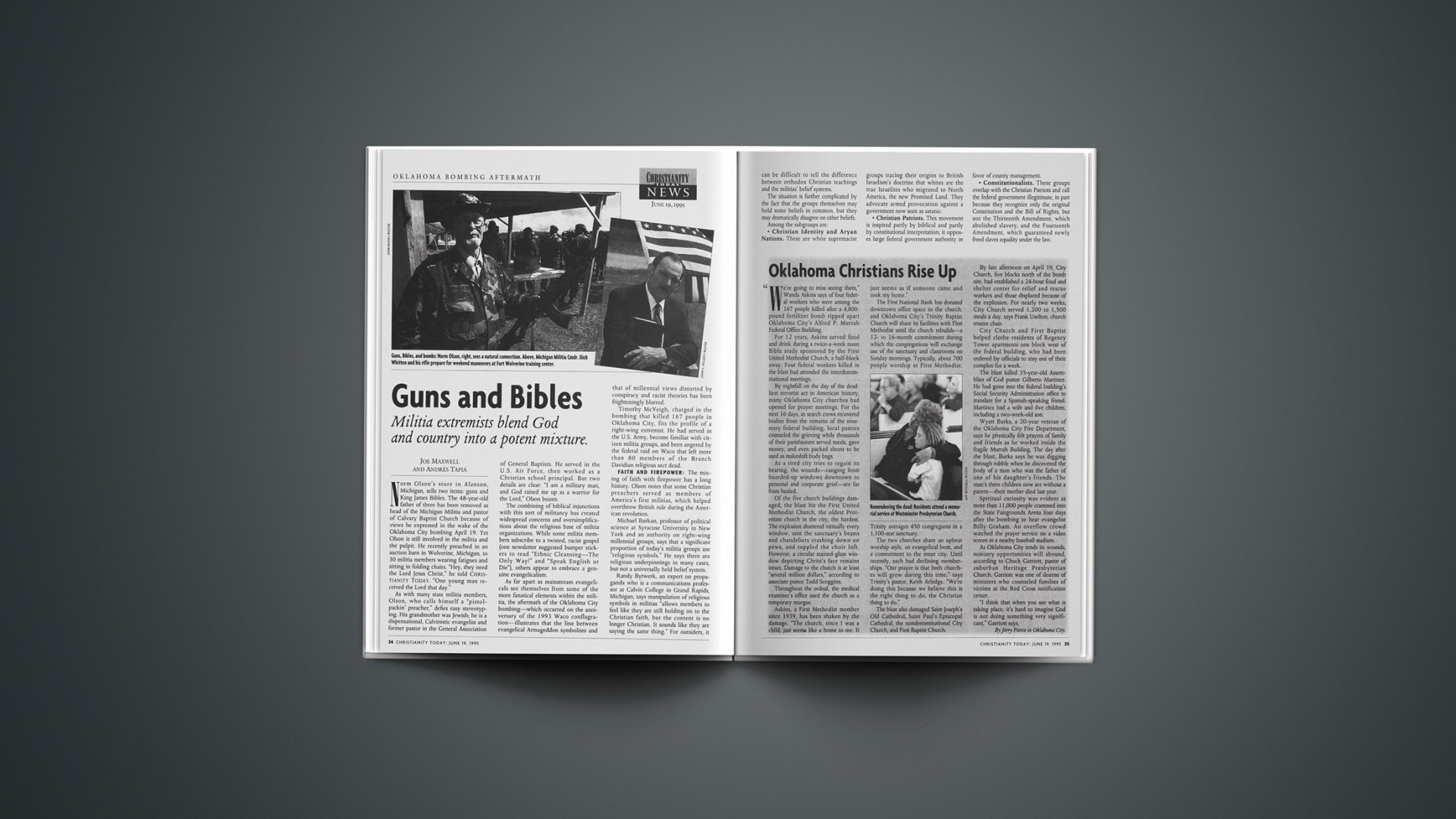We’re going to miss seeing them,” Wanda Askins says of four federal workers who were among the 167 people killed after a 4,800-pound fertilizer bomb ripped apart Oklahoma City’s Alfred P. Murrah Federal Office Building.
For 12 years, Askins served food and drink during a twice-a-week noon Bible study sponsored by the First United Methodist Church, a half-block away. Four federal workers killed in the blast had attended the interdenominational meetings.
By nightfall on the day of the deadliest terrorist act in American history, many Oklahoma City churches had opened for prayer meetings. For the next 16 days, as search crews recovered bodies from the remains of the nine-story federal building, local pastors counseled the grieving while thousands of their parishioners served meals, gave money, and even packed sheets to be used as makeshift body bags.
As a tired city tries to regain its bearing, the wounds-ranging from boarded-up windows downtown to personal and corporate grief-are far from healed.
Of the five church buildings damaged, the blast hit the First United Methodist Church, the oldest Protestant church in the city, the hardest. The explosion shattered virtually every window, sent the sanctuary’s beams and chandeliers crashing down on pews, and toppled the choir loft. However, a circular stained-glass window depicting Christ’s face remains intact. Damage to the church is at least “several million dollars,” according to associate pastor Todd Scoggins.
Throughout the ordeal, the medical examiner’s office used the church as a temporary morgue.
Askins, a First Methodist member since 1939, has been shaken by the damage. “The church, since I was a child, just seems like a home to me. It just seems as if someone came and took my home.”
The First National Bank has donated downtown office space to the church, and Oklahoma City’s Trinity Baptist Church will share its facilities with First Methodist until the church rebuilds-a 12- to 16-month commitment during which the congregations will exchange use of the sanctuary and classrooms on Sunday mornings. Typically, about 700 people worship at First Methodist. Trinity averages 450 congregants in a 1,100-seat sanctuary.
The two churches share an upbeat worship style, an evangelical bent, and a commitment to the inner city. Until recently, each had declining memberships. “Our prayer is that both churches will grow during this time,” says Trinity’s pastor, Keith Arledge. “We’re doing this because we believe this is the right thing to do, the Christian thing to do.”
The blast also damaged Saint Joseph’s Old Cathedral, Saint Paul’s Episcopal Cathedral, the nondenominational City Church, and First Baptist Church.
By late afternoon on April 19, City Church, five blocks north of the bomb site, had established a 24-hour food and shelter center for relief and rescue workers and those displaced because of the explosion. For nearly two weeks, City Church served 1,200 to 1,500 meals a day, says Frank Uselton, church trustee chair.
City Church and First Baptist helped clothe residents of Regency Tower apartments one block west of the federal building, who had been ordered by officials to stay out of their complex for a week.
The blast killed 35-year-old Assemblies of God pastor Gilberto Martinez. He had gone into the federal building’s Social Security Administration office to translate for a Spanish-speaking friend. Martinez had a wife and five children, including a two-week-old son.
Wyatt Burks, a 20-year veteran of the Oklahoma City Fire Department, says he physically felt prayers of family and friends as he worked inside the fragile Murrah Building. The day after the blast, Burks says he was digging through rubble when he discovered the body of a man who was the father of one of his daughter’s friends. The man’s three children now are without a parent—their mother died last year.
Spiritual curiosity was evident as more than 11,000 people crammed into the State Fairgrounds Arena four days after the bombing to hear evangelist Billy Graham. An overflow crowd watched the prayer service on a video screen in a nearby baseball stadium.
As Oklahoma City tends its wounds, ministry opportunities will abound, according to Chuck Garriott, pastor of suburban Heritage Presbyterian Church. Garriott was one of dozens of ministers who counseled families of victims at the Red Cross notification center.
“I think that when you see what is taking place, it’s hard to imagine God is not doing something very significant,” Garriott says.
Copyright © 1995 Christianity Today. Click for reprint information.
ctjun95mrw5T7035566b










